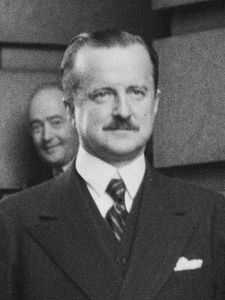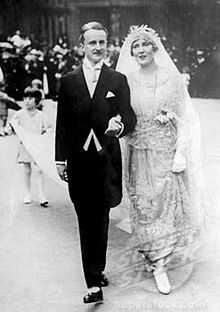Duff Cooper
| The Right Honourable The Viscount Norwich GCMG DSO PC | |
|---|---|
 | |
| Duff Cooper in 1941 | |
| Secretary of State for War | |
| In office 22 November 1935 – 28 May 1937 | |
| Monarch | George V Edward VIII George VI |
| Prime Minister | Stanley Baldwin |
| Preceded by | The Viscount Halifax |
| Succeeded by | Leslie Hore-Belisha |
| Chancellor of the Duchy of Lancaster | |
| In office 20 July 1941 – 11 November 1943 | |
| Prime Minister | Winston Churchill |
| Preceded by | The Lord Hankey |
| Succeeded by | Ernest Brown |
| Ambassador to France | |
| In office 1944–1948 | |
| Monarch | George VI |
| Preceded by | Vacant due to German occupation |
| Succeeded by | Oliver Harvey |
| Personal details | |
| Born | 22 February 1890 |
| Died | 1 January 1954 |
| Nationality | British |
| Political party | Conservative |
| Spouse(s) | Lady Diana Manners (1892–1986) |
| Alma mater | New College, Oxford |
Alfred Duff Cooper, 1st Viscount Norwich GCMG DSO PC (22 February 1890 – 1 January 1954), known as Duff Cooper, was a British Conservative Party politician, diplomat and author. He wrote six books, including an autobiography, Old Men Forget, and a biography of the French diplomat Talleyrand. He wrote one novel, Operation Heartbreak (1950), which has been republished by Persephone Books.
Background and education
The only son of fashionable society doctor Sir Alfred Cooper and Lady Agnes Duff, daughter of James Duff, 5th Earl Fife, Duff Cooper was the youngest of their four children. He had royal connections: his maternal uncle, the first Duke of Fife, was married to Louise, Princess Royal, the daughter of King Edward VII, while his mother's maternal grandmother was Elizabeth Hay, Countess of Erroll, an illegitimate daughter of King William IV and his mistress Dorothy Jordan. Cooper enjoyed a typical gentleman's upbringing of country estates, London society, Wixenford School[1] Eton College and New College, Oxford.

Early life and marriage
At Oxford, his Eton friendship with The Honourable John Nevile Manners, won him entry into a famous circle of young aristocrats and intellectuals known as the Coterie, including Patrick Shaw-Stewart, Raymond Asquith (son of the Prime Minister), Sir Denis Anson, Edward Horner and the celebrated Lady Diana Manners. He cultivated a reputation for eloquence and fast living and although he had established a reputation as a poet, he earned an even stronger reputation for gambling, womanizing, and drinking in his studied emulation of the life of the 18th and 19th Whig statesman Charles James Fox.
Following Oxford, he entered the Foreign Service and, owing to the national importance of his work at the cipher desk, he was excluded from military service until 1917, when he joined the Grenadier Guards.[2] He served with distinction as a lieutenant in the campaigns of 1918, winning a Distinguished Service Order (DSO) for conspicuous gallantry. Almost all of his closest friends, including Shaw-Stewart, Horner, Asquith and John Manners were killed in the war, drawing him closer to Lady Diana Manners, whom he married in 1919. An extremely popular social figure hailed for her beauty and eccentricities, she was one of several daughters born to the Duke and Duchess of Rutland; her biological father, however, was believed to be the English politician Harry Cust, known as one of the most handsome men of his day.[3]
His service in the First World War was highlighted by the ITV programme "The Great War: The People's story", where his correspondence with Diana Cooper was one of those selected to be dramatised.
The Coopers' marriage was fraught with infidelities, notably Duff's affairs with the Franco-American Singer sewing-machine heiress Daisy Fellowes, the socialite Gloria Guinness, the French novelist Louise Leveque de Vilmorin and the writer Susan Mary Alsop (then an American diplomat's wife, by whom he had an illegitimate son, William Patten Jr.),[4][5] The polo player 'Boy' Capel's wife Diana, and the Anglo-Irish socialite and fashion model Maxime de La Falaise were two more, although Lady Diana reportedly did not mind, explaining to their son that "They were the flowers, but I was the tree."[6]
Political career
Returning to the Foreign Service, he became principal private secretary to two ministers and played a significant role in the Egyptian and Turkish crises in the early 1920s, before winning a seat in Parliament as a Conservative for Oldham in 1924. He gave one of the most acclaimed maiden speeches of the century and became known as a stalwart supporter of Stanley Baldwin, the Prime Minister, and a friend of Chancellor of the Exchequer, Winston Churchill. Cooper became Financial Secretary to the War Office in January, 1928, before losing his seat in the 1929 election when the Conservative Party lost power.
Turning to literature, he produced Talleyrand (1932), a short biography that was published by his nephew Rupert Hart-Davis to critical praise and lasting success.[7] The 1931 by-election for the constituency of Westminster St. George's saw the Empire Free Trade Crusade party threatening the Conservative position at a time when satisfaction with Baldwin's leadership was at a low. When the original Conservative candidate stepped down, Duff Cooper agreed to contest the election in what was regarded as a referendum on Baldwin's leadership. He won the seat with a majority of 5,710, thus returning to Parliament and serving until 1945.[8]
Cooper returned to ministerial office as Financial Secretary to the War Office in 1931, then as Financial Secretary to the Treasury in 1934, he was elevated to the Cabinet as War Secretary in 1935, and promoted to First Lord of the Admiralty in 1937. He completed a biography of the British military commander Douglas Haig during this period. The most public critic of the Prime Minister of the day Neville Chamberlain's appeasement policy inside the Cabinet, he famously resigned the day after the 1938 Munich Agreement made with Adolf Hitler. On doing so he said, "War with honour or peace with dishonour," he might have been persuaded to accept, "but war with dishonour--that was too much." [9] Fellow appeasement critic and Conservative Party MP Vyvyan Adams described Cooper's actions as "the first step in the road back to national sanity." Cooper later took a prominent role in the famous Norway Debate of 1940, which led to Chamberlain's downfall.
By now Cooper appeared in German propaganda as one of Britain's three most dangerous Conservative warmongers.[10] He entered the Cabinet as Minister of Information under Winston Churchill, but after a controversial appointment as Resident Cabinet Minister in Singapore in 1941, he did not play a major role in the direction of the war until appointed the British Government's liaison to the Free French in 1943. He subsequently became the British ambassador to France in 1944, and was a great success in Paris. He left office in 1947, was knighted, and devoted himself primarily to literature until his death in 1954, at the age of 63. He produced during this period the classic autobiography Old Men Forget and was eventually created Viscount Norwich, of Aldwick in the County of Sussex, in 1952, in recognition of his political and literary career.[11] His wife refused to be called Lady Norwich, claiming that it sounded too much like "porridge" and promptly took out a newspaper advertisement declaring that she would retain her previous style of Lady Diana Cooper.
Family
Duff Cooper's only legitimate child, John Julius Norwich (born 1929), became well known as a writer and television host and has published a collection of his father's diaries, The Duff Cooper Diaries: 1915–1951.[12] His granddaughter Artemis Cooper has published several books, including A Durable Fire: The Letters of Duff and Diana Cooper, 1913–50. Another granddaughter is screenwriter Allegra Huston, the only child of Norwich and Enrica Soma Huston, estranged wife of the American film director John Huston. Duff Cooper's niece Enid Levita (daughter of his sister Stephanie), is the paternal grandmother of the Conservative Party leader David Cameron, who became Prime Minister in 2010. Duff Cooper was the subject of a biography by John Charmley and a British literary award, the Duff Cooper Prize, was established in his name.[13]
In popular culture
H. G. Wells, in The Shape of Things to Come, published in 1934, predicted a Second World War in which Britain would not participate but would vainly try to effect a peaceful compromise. In this vision, Duff Cooper was mentioned as one of several prominent Britons delivering "brilliant pacific speeches" which "echo throughout Europe" but fail to end the war; the other would-be peacemakers, in Wells' vision, included Leslie Hore Belisha, Ellen Wilkinson and Randolph Churchill.[14]
References
Notes
- ↑ Cooper, Duff. Old Men Forget (1953), p. 31
- ↑ Cooper, Duff. The Papers of Alfred Duff Cooper (1st Viscount Norwich). Cambridge University Press.
- ↑ Diana herself had revealed that although she was brought up as a daughter of the eighth Duke of Rutland, she was actually fathered by Harry Cust, a Lincolnshire landowner and Member of Parliament (MP). (Khan, Urmee, "Allegra Huston Speaks of the Shock at Discovering She was the Love Child of a Lord", The Daily Telegraph (6 April 2009)
- ↑ Vanity Fair (February 2006)
- ↑ Sheppard, Ben; Alderson, Andrew (8 January 2006). "Revealed: Duff Cooper's secret second son". The Daily Telegraph. Retrieved 1 May 2010.
- ↑ "John Julius Norwich:'Deep down, I'm shallow. I really am'". The Daily Telegraph. 4 June 2008. Retrieved 1 May 2010.
- ↑ Cooper, 2001 (1932).
- ↑ Peele, Gillian "St George's and the Empire Crusade" in Cook, Chris and Ramsden, John (eds/) By-elections in British politics. UCL Press, 1997
- ↑ Norwich, John Julius (2011). A History of England in 100 places. London: John Murray. p. 425. ISBN 978-1-84854-606-6.
- ↑ Stenton, Michael (2000). Radio London and Resistance in Occupied Europe: British Political Warfare 1939–1943. Oxford University Press. pp. 9–10. ISBN 0-19-820843-X.
- ↑ "Whitehall, July 8, 1952". London Gazette. 8 July 1952. p. 3699.
- ↑ Norwich, 2005.
- ↑ Charmley, 1997 (1986).
- ↑ Wells, H. G. "9. The Last War Cyclone, 1940-50" in The Shape of Things to Come (1934)
Bibliography
- Charmley, John. Duff Cooper. Revised paperback ed. London: Weidenfeld & Nicolson, 1997 (1986). ISBN 978-0-7538-0246-5.
- Cooper, Duff. Talleyrand. Grove Great Lives. New York: Grove Atlantic, 2001 (1932). ISBN 978-0-8021-3767-8.
- Norwich, John Julius. The Duff Cooper Diaries 1915–1951. London: Weidenfeld & Nicolson, 2005. ISBN 978-0-297-84843-1
- Ziegler, Philip (January 2008). "Cooper, (Alfred) Duff, first Viscount Norwich (1890–1954)". Oxford Dictionary of National Biography. Oxford University Press. Retrieved 11 December 2008. (subscription or UK public library membership required)
External links
- Hansard 1803–2005: contributions in Parliament by the Viscount Norwich
- Archival material relating to Duff Cooper listed at the UK National Archives
|